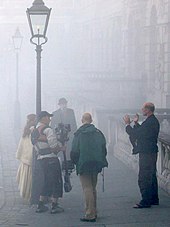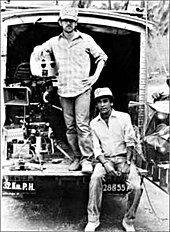Film director
| Occupation | |
|---|---|
Occupation type | Profession |
Activity sectors | Film |
| Description | |
| Competencies | Film directing |
Fields of employment | Film production company |
| Part of a series on |
| Filmmaking |
|---|
 |
| Glossary |

A film director is a person who controls a film's artistic and dramatic aspects and visualizes the screenplay (or script) while guiding the film crew and actors in the fulfillment of that vision. The director has a key role in choosing the cast members, production design and all the creative aspects of filmmaking in cooperation with the producer.[1]
The film director gives direction to the cast and crew and creates an overall vision through which a film eventually becomes realized or noticed. Directors need to be able to mediate differences in creative visions and stay within the budget.
There are many pathways to becoming a film director. Some film directors started as screenwriters, cinematographers, producers, film editors or actors. Other film directors have attended film school. Directors use different approaches. Some outline a general plotline and let the actors improvise dialogue, while others control every aspect and demand that the actors and crew follow instructions precisely. Some directors also write their own screenplays or collaborate on screenplays with long-standing writing partners. Other directors edit or appear in their films or compose music score for their films.[2]
Responsibility
[edit]
A film director's task is to envisage a way to translate a screenplay into a fully formed film, and then to realize this vision.[3] To do this, they oversee the artistic and technical elements of film production.[2][4] This entails organizing the film crew in such a way to achieve their vision of the film and communicating with the actors.[5][6] This requires skills of group leadership, as well as the ability to maintain a singular focus even in the stressful, fast-paced environment of a film set.[7] Moreover, it is necessary to have an artistic eye to frame shots and to give precise feedback to cast and crew,[8] thus, excellent communication skills are a must.[9]
Because the film director depends on the successful cooperation of many different creative individuals with possibly strongly contradicting artistic ideals and visions, they also need to possess conflict-resolution skills to mediate whenever necessary.[10] Thus the director ensures that all individuals involved in the film production are working towards an identical vision for the completed film.[5] The set of varying challenges they have to tackle has been described as "a multi-dimensional jigsaw puzzle with egos and weather thrown in for good measure".[11] It adds to the pressure that the success of a film can influence when and how they will work again, if at all.[12]
Generally, the sole superiors of the director are the producers and the studio that is financing the film, although sometimes the director can also be a producer of the same film.[3][13] The role of a director differs from producers in that producers typically manage the logistics and business operations of the production, whereas the director is tasked with making creative decisions. The director must work within the restrictions of the film's budget[14] and the demands of the producer and studio (such as the need to get a particular age rating).[15]
Directors also play an important role in post-production. While the film is still in production, the director sends "dailies" to the film editor and explains their overall vision for the film, allowing the editor to assemble an editor's cut. In post-production, the director works with the editor to edit the material into the director's cut. Well-established directors have the "final cut privilege", meaning that they have the final say on which edit of the film is released. For other directors, the studio can order further edits without the director's permission.
The director is one of the few positions that requires intimate involvement during every stage of film production. Thus, the position of film director is widely considered to be a highly stressful and demanding one.[16] It has been said that "20-hour days are not unusual".[3] Some directors also take on additional roles, such as producing, writing or editing.
Under European Union law, the film director is considered the "author" or one of the authors of a film, largely as a result of the influence of auteur theory.[17] Auteur theory is a film criticism concept that holds that a film director's film reflects the director's personal creative vision, as if they were the primary "auteur" (the French word for "author").[18] In spite of—and sometimes even because of—the production of the film as part of an industrial process, the auteur's creative voice is distinct enough to shine through studio interference and the collective process.[citation needed]
Career pathways
[edit]
Some film directors started as screenwriters, film editors, producers, actors, or film critics, as well as directing for similar media like television and commercials.[19][20] Several American cinematographers have become directors, including Barry Sonnenfeld, originally the Coen brothers' Director of Photography; Wally Pfister, cinematographer on Christopher Nolan's three Batman films made his directorial debut with Transcendence (2014). Despite the misnomer, assistant director has become a completely separate career path and is not typically a position for aspiring directors, but there are exceptions in some countries such as India where assistant directors are indeed directors-in-training.[21][22]
Education
[edit]Many film directors have attended a film school to get a bachelor's degree studying film or cinema.[23] Film students generally study the basic skills used in making a film.[24] This includes, for example, preparation, shot lists and storyboards, blocking, communicating with professional actors, communicating with the crew, and reading scripts.[25] Some film schools are equipped with sound stages and post-production facilities.[26] Besides basic technical and logistical skills, students also receive education on the nature of professional relationships that occur during film production.[27] A full degree course can be designed for up to five years of studying.[28] Future directors usually complete short films during their enrollment.[16] The National Film School of Denmark has the student's final projects presented on national TV.[29] Some film schools retain the rights for their students' works.[30] Many directors successfully prepared for making feature films by working in television.[31] The German Film and Television Academy Berlin consequently cooperates with the Berlin/Brandenburg TV station RBB (Berlin-Brandenburg Broadcasting) and ARTE.[32]
In recent decades American directors have primarily been coming out of USC, UCLA, AFI, Columbia University, and NYU, each of which is known for cultivating a certain style of filmmaking.[20] Notable film schools outside of the United States include Beijing Film Academy, Centro de Capacitación Cinematográfica in Mexico City, Dongseo University in South Korea, FAMU in Prague, Film and Television Institute of India, HFF Munich, La Fémis in Paris, Tel Aviv University, and Vancouver Film School.[33]
Compensation
[edit]Film directors usually are self-employed and hired per project based on recommendations and industry reputation.[34] Compensation might be arranged as a flat fee for the project, as a weekly salary, or as a daily rate.
A handful of top Hollywood directors made from $133.3 million to $257.95 million in 2011, such as James Cameron and Steven Spielberg,[35] but the average United States film directors and producers made $89,840 in 2018.[36] A new Hollywood director typically gets paid around $400,000 for directing their first studio film.[37]
The average annual salary in England is £50,440, [38] in Canada is $62,408,[39] and in Western Australia it can range from $75,230 to $97,119.[40] In France, the average salary is €4000 per month, paid per project.[41] Luc Besson was the highest paid French director in 2017, making €4.44 million for Valerian and the City of a Thousand Planets. That same year, the top ten French directors' salaries in total represented 42% of the total directors' salaries in France.[42]
Film directors in Japan average a yearly salary from ¥4 million to ¥10 million,[43] and the Directors Guild of Japan requires a minimum payment of ¥3.5 million.[44] Korean directors make 300 million to 500 million won for a film, and beginning directors start out making around 50 million won. A Korean director who breaks into the Chinese market might make 1 billion won for a single film.[45]
Gender disparities
[edit]According to a 2018 report from UNESCO, the film industry throughout the world has a disproportionately higher number of male directors compared to female directors, and they provide as an example the fact that only 20% of films in Europe are directed by women.[46] 44% of graduates from a sample of European films schools are women, and yet women are only 24% of working film directors in Europe. However only a fraction of film school graduates aspire to direct with the majority entering the industry in other roles.[47] In Hollywood, women make up only 12.6 percent of film directors, as reported by a UCLA study of the 200 top theatrical films of 2017,[48] but that number is a significant increase from 6.9% in 2016.[49] As of 2014, there were only 20 women in the Directors Guild of Japan out of the 550 total members.[50] Indian film directors are also greatly underrepresented by women, even compared to other countries, but there has been a recent trend of more attention to women directors in India, brought on partly by Amazon and Netflix moving into the industry.[51] Of the movies produced in Nollywood, women direct only 2%.[52]
Awards
[edit]
There are many different awards for film directing, run by various academies, critics associations, film festivals, and guilds.[53] The Academy Award for Best Director and Cannes Film Festival Award for Best Director are considered among the most prestigious awards for directing,[54][55][56][57] and there is even an award for worst directing given out during the Golden Raspberry Awards.
See also
[edit]- Outline of film
- List of unions for film directing
- Alan Smithee (pseudonym for anonymous directors)
References
[edit]- ^ Bean-Mellinger, Barbara (December 27, 2018). "The Average Film Director Salary Per Movie". Career Trend. Leaf Group. Archived from the original on February 12, 2022. Retrieved February 28, 2019.
- ^ a b "TV or film director". National Careers Service. United Kingdom: British Government. April 2017. Archived from the original on July 30, 2017. Retrieved May 10, 2017.
- ^ a b c "Career Profile: Film Director". Filmschools.com. Monster. Archived from the original on April 10, 2022. Retrieved February 3, 2019.
- ^ "Employment Film Director". MediaCollege.com. Wavelength Media. Archived from the original on August 1, 2022. Retrieved March 3, 2013.
- ^ a b Piccirillo, Ryan A. (2010). "Career snapshot: The Film Director, A Human Lens". Inquiries Journal/Student Pulse. Archived from the original on July 2, 2022. Retrieved February 28, 2019.
- ^ "How to Become a Film Director". Academic Invest. Archived from the original on February 5, 2023. Retrieved March 3, 2013.
They must work with producers, writers, cast members, crew members, designers and other professionals in order to implement that vision
- ^ "Director (fim, television, radio, or stage)". Government of Western Australia Department of Training and Workforce Development. Archived from the original on May 9, 2013. Retrieved March 3, 2013.
- ^ "Film Director Career: Pros and Cons". LearningPath.org. Archived from the original on February 5, 2023. Retrieved February 28, 2019.
- ^ "Explore careers: TV or film director". National Careers Service. Education and Skills Funding Agency. Archived from the original on October 3, 2012. Retrieved March 3, 2013.
- ^ McRae, Alex (June 1, 2006). "I Want Your Job: Film Director". The Independent. London. Archived from the original on February 5, 2023. Retrieved March 3, 2013.
You have to be a diplomat. You have to marshal a whole load of creative people, who often don't get on with each other, and your job is to stop things turning into a bun-fight.
- ^ Thomas, Delyth. "What is a Director?". Directors UK. Archived from the original on 2013-01-17. Retrieved March 3, 2013.
- ^ "Producers and Directors:Occupational Outlook Handbook". U.S. Bureau of Labor Statistics. Archived from the original on February 5, 2023. Retrieved March 3, 2013.
directors work under a lot of pressure, and most are under constant stress to find their next job.
- ^ "What Producers and Directors Do". Bureau of Labor Statistics. Archived from the original on February 5, 2023. Retrieved February 28, 2019.
Although directors are in charge of the creative aspects of a show, they ultimately answer to producers. Some directors also share producing duties for their own films.
- ^ "Film Directing: Job Profile". Internationale Filmschule Köln. Archived from the original on 2013-05-10. Retrieved March 3, 2013.
The director is bound by financial conditions, which however should not hinder him from developing his own artistic signature.
- ^ Hornaday, Ann (May 16, 1993). "Now Starring on Video: The Director's Cut". The New York Times. Archived from the original on November 18, 2015. Retrieved November 25, 2015.
Realizing that an NC-17 rating could hurt business (some theaters and newspapers won't show or advertise NC-17 movies), Mr. Verhoeven cut 47 seconds of the most graphic sex and violence.
- ^ a b "Film Director". The Princeton Review. Archived from the original on March 1, 2019. Retrieved February 28, 2019.
- ^ Pascal Kamina (2002). Film Copyright in the European Union. Cambridge University Press. p. 153. ISBN 978-1-139-43338-9.
- ^ "Auteur theory | Definition & Directors". Encyclopedia Britannica. Archived from the original on 2018-03-10. Retrieved 2018-02-08.
- ^ "Film Director: Occupations in Alberta". Alberta Learning Information Service. Government of Alberta. Archived from the original on November 6, 2018. Retrieved February 28, 2019.
Many are experienced actors, editors or writers
- ^ a b Wexman, Virginia Wright (2017). Directing. New Brunswick: Rutgers University Press. p. 7. ISBN 9780813564296.
- ^ "What's an Assistant Director?". Directors Guild of America. Archived from the original on July 1, 2019. Retrieved June 30, 2019.
- ^ Fatima, Nishat (January 20, 2012). "Here's how you can get into Bollywood". Times of India. Archived from the original on July 1, 2019. Retrieved June 30, 2019.
- ^ "How to Become a Producer or Director". Bureau of Labor Statistics. Archived from the original on March 1, 2019. Retrieved February 28, 2019.
- ^ "Film". LUCA School of Arts. Archived from the original on May 11, 2013. Retrieved March 3, 2013.
In the Fiction Film bachelor studio students learn the basic principles, techniques and procedures of film direction and production
- ^ "Directing Department at LFS". London Film School. Archived from the original on 2013-02-17. Retrieved March 3, 2013.
Classes supporting this area discuss and rehearse: preparation, shot lists and storyboards, blocking, protocols of dealing with professional actors, reading scripts, the construction of film sequence
- ^ "Film BA Honours - Courses". University of Westminster. Archived from the original on May 9, 2013. Retrieved March 3, 2013.
We operate from a purpose-built studio facility in Harrow, with two sound stages, a set construction workshop, and extensive post-production facilities.
- ^ "BA Film Directing". Internationale Filmschule Köln. Archived from the original on 2013-05-10. Retrieved March 3, 2013.
An intrinsic element of the education, alongside the transfer of organizational and technical skills, is to provide the students with insights into social contexts and relationships
- ^ "Direction". Institut des Arts de Diffusion. Archived from the original on 2013-07-23. Retrieved March 3, 2013.
The directing studies 5 years of study : a first cycle of 3 years and a second cycle of 2 years.
- ^ "About the school". Den Danske Filmskole. Archived from the original on May 28, 2013. Retrieved March 15, 2013.
The students' final project is a film produced on a professional level and presented to the public on national TV.
- ^ "Filmmaking Guide: Copyright". BBC. Archived from the original on April 10, 2013. Retrieved March 3, 2013.
If you're a student and making your film within a film school then you should be aware that some film schools will retain the copyright in the films that you make during your enrollment
- ^ "Professional Screen Directing Diploma". Central Film School. Archived from the original on 2012-10-19. Retrieved March 3, 2013.
Many successful film directors, including Oscar-winning Best Director of 'The King's Speech', Tom Hooper, began their careers in television, which provided the platform to progress through the industry.
- ^ "The DFFB". German Film and Television Academy Berlin. Archived from the original on March 4, 2013. Retrieved March 3, 2013.
The DFFB cooperates with the Berlin/Brandenburg TV station RBB and ARTE and produces 3 short films of 30minutes lengths for RBB and 10 short films of 5 minutes lengths for ARTE
- ^ "Entertainment Education Report: The Best Film Schools in 2018". Variety. April 25, 2018. Archived from the original on March 24, 2019. Retrieved June 23, 2019.
- ^ "Film director job profile". Graduate Prospects directors cut. Archived from the original on December 11, 2019. Retrieved December 11, 2019.
- ^ Imani, Faizah. "Typical Salary of a Film Director". Chron.com. Archived from the original on March 2, 2019. Retrieved February 28, 2019.
- ^ "Occupational Employment and Wages, May 2018: Producers and Directors". Bureau of Labor Statistics. March 29, 2019. Archived from the original on December 11, 2019. Retrieved December 11, 2019.
- ^ "Hollywood's Salary Report 2017: Movie Stars to Makeup Artists to Boom Operators". The Hollywood Reporter. September 28, 2019. Archived from the original on December 11, 2019. Retrieved December 11, 2019.
- ^ Maguire, Emily (August 11, 2023). "Media Jobs and the Director's Chair: A Guide to Becoming a Film Director". Reflections Career Coaching. Archived from the original on Nov 6, 2023. Retrieved October 25, 2023.
- ^ "Film Director: Occupations in Alberta". Alberta Learning Information Service. Government of Alberta. December 15, 2016. Archived from the original on December 11, 2019. Retrieved December 11, 2019.
- ^ "Director (film television radio or stage)". Jobs and Skills WA. Government of Western Australia Department of Training and Workforce Development. November 14, 2019. Archived from the original on December 11, 2019. Retrieved December 11, 2019.
- ^ Lesparre, Josée. "Réalisatrice / Réalisateur : métier, études, diplômes, salaire, formation" [Director: occupation, studies, diplomas, salary, training]. Centre d'Information et de Documentation Jeunesse (in French). Archived from the original on December 11, 2019. Retrieved December 11, 2019.
- ^ Vulser, Nicole (January 17, 2018). "Et le réalisateur français le mieux payé en 2017 est...Luc Besson" [And the best paid French director in 2017 is...Luc Besson]. Le Monde (in French). Archived from the original on January 14, 2020. Retrieved December 11, 2019.
- ^ "映画監督の給与・年収は?初任給やインセンティブ収入などについて解説" [What is the salary and annual income of the film director? Commentary on starting salary and incentive income]. Job Zukan (in Japanese). Archived from the original on January 14, 2020. Retrieved December 11, 2019.
- ^ "映画監督の給料・年収・収入" [Movie director's salary, annual income, income]. Career Garden (in Japanese). Archived from the original on January 14, 2020. Retrieved December 11, 2019.
- ^ 최호원 (December 18, 2013). "[취재파일]한국 영화감독들의 연출료 수입은?" [How much income do Korean film directors receive?]. SBS News. Archived from the original on December 11, 2019. Retrieved December 11, 2019.
- ^ "Mind the Gap: gender equality in the film industry". UNESCO. 25 February 2019. Archived from the original on 14 January 2020. Retrieved 27 June 2019.
- ^ Joseph, Ammu (2017). "Gender Equality: Missing in Action". Re-Shaping Cultural Policies (PDF). UNESCO. p. 191. ISBN 978-92-3-100256-4. Archived from the original (PDF) on 27 January 2018. Retrieved 27 June 2019.
- ^ Hunt, Darnell; Ramón, Ana-Christina; Tran, Michael (2019). "Hollywood Diversity Report 2019" (PDF). UCLA. p. 3. Archived (PDF) from the original on 5 April 2019. Retrieved 27 June 2019.
- ^ Hunt, Darnell; Ramón, Ana-Christina; Tran, Michael (2019). "Hollywood Diversity Report 2019" (PDF). UCLA. p. 29. Archived (PDF) from the original on 5 April 2019. Retrieved 27 June 2019.
- ^ Blair, Gavin (1 April 2014). "Japan's Female Directors Making Their Mark in Patriarchal Industry". The Hollywood Reporter. Archived from the original on 16 June 2019. Retrieved 27 June 2019.
- ^ Bhushan, Nyay (21 May 2017). "How Female Filmmakers Are Transforming Indian Cinema". The Hollywood Reporter. Archived from the original on 14 January 2020. Retrieved 27 June 2019.
- ^ Christina (13 February 2019). "The Remarkable Triumph of Female Nollywood Directors". Nollywood Mania. Archived from the original on 14 January 2020. Retrieved 27 June 2019.
- ^ Desta, Yohana (September 10, 2018). "Everything You Always Wanted to Know About Awards Season (But Were Afraid to Ask)". Vanity Fair. Archived from the original on January 14, 2020. Retrieved January 14, 2020.
- ^ "This year's Oscar for best director will definitely go to a man". Al Jazeera English. January 13, 2020. Archived from the original on January 14, 2020. Retrieved January 14, 2020.
- ^ Patos, Robert (May 29, 2017). "Sofia Coppola Wins Best Director at Cannes 2017 for 'The Beguiled'". Hypebeast. Archived from the original on January 14, 2020. Retrieved January 14, 2020.
- ^ Staszczyszyn, Bartosz (May 19, 2018). "Paweł Pawlikowski Wins Best Director At Cannes 2018". Culture.pl. Archived from the original on January 14, 2020. Retrieved January 14, 2020.
- ^ "Sofia Coppola scoops Cannes Best Director prize for The Beguiled". Irish Independent. May 29, 2017. Archived from the original on January 14, 2020. Retrieved January 14, 2020.
Further reading
[edit]- Spencer Moon: Reel Black Talk: A Sourcebook of 50 American Filmmakers, Greenwood Press 1997
- The St. James Women Filmmakers Encyclopedia: Women on the Other Side of the Camera, Visible Ink Press, 1999
- International dictionary of films and filmmakers, ed. by Tom Pendergast, 4 volumes, Detroit [etc.]: St. James Press, 4th edition 2000, vol. 2: Directors
- Contemporary North American Film Directors: A Wallflower Critical Guide (Wallflower Critical Guides to Contemporary Directors), ed. by Yoram Allon Del Cullen and Hannah Patterson, Second Edition, Columbia Univ Press 2002
- Alexander Jacoby, Donald Richie: A Critical Handbook of Japanese Film Directors: From the Silent Era to the Present Day, Stone Bridge Press, 2008, ISBN 1-933330-53-8
- Rebecca Hillauer: Encyclopedia of Arab Women Filmmakers, American University in Cairo Press, 2005, ISBN 977-424-943-7
- Roy Armes: Dictionary of African Filmmakers, Indiana University Press, 2008, ISBN 0-253-35116-2
- Philippe Rege: Encyclopedia of French Film Directors, Scarecrow Press, 2009
External links
[edit]
